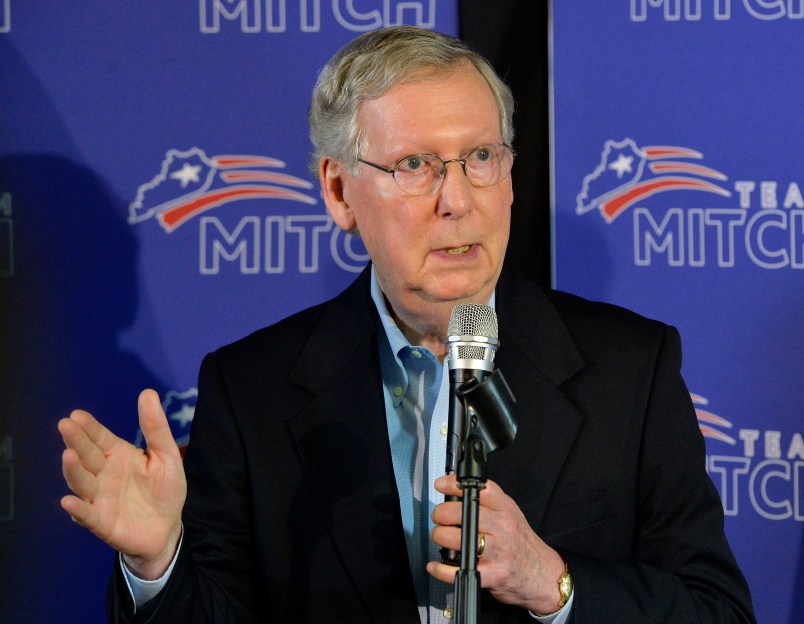Sen. Mitch McConnell, facing perhaps the toughest reelection fight of his career, is obscuring his position on a number of policy issues, some of which he previously staked out aggressively and strictly enforced party discipline over.
The latest forecasts by the New York Times and FiveThirtyEight rate the minority leader as the most vulnerable GOP incumbent in the November Senate races, where Republicans have a considerable advantage. And although Democrat Alison Lundergan Grimes has an uphill climb in bright red Kentucky, the Republican leader is taking no chances — even if it means backing away from some key policy positions he’s taken that are unpopular with moderates.
Here are three issues where McConnell’s campaign has obscured his stance.
1. Ryan budget? What Ryan budget?
McConnell has been an aggressive supporter of the controversial budget blueprints by Rep. Paul Ryan (R-WI) to slash taxes and privatize Medicare — he voted for them when they came up in 2011, 2012, and 2013.
Recently Grimes attacked him in an ad claiming the 2011 version of Ryan’s budget would raise a retiree’s Medicare costs by $6,000. In response McConnell’s campaign backed away from his previous alliance with Ryan’s budget, telling FactCheck.org, “There is no way to speculate if [McConnell] would have voted for final passage without having debated amendments.” His campaign made a similar comment to a WFPL reporter.
To be sure, Grimes’ attack was embellished — the $6,000 figure applied only to the 2011 Ryan budget, not the updated versions, and would impact those 55 and under at time of passage. But McConnell’s campaign didn’t argue that, nor did it respond to TPM’s requests to explain what he’d want to change in the budget.
Instead he distanced himself from a proposal that is an article of faith in the GOP, which he strongly supported and united nearly every GOP senator behind.
2. Obamacare is unconnected to … Obamacare
It is a cruel irony that McConnell, Obamacare’s most formidable enemy, hails from a state where it is working considerably well. In May, faced with the fact that some 413,000 Kentuckians are benefiting from Obamacare via its popular state exchange Kynect, McConnell told home state reporters the two were “unconnected” when asked if he wanted to dismantle Kynect.
His campaign spokeswoman explained his position: “If Obamacare is repealed, Kentucky should decide for itself whether to keep Kynect or set up a different marketplace,” said Allison Moore.
The stance is unconnected to Obamacare realities. Kynect is inoperable without the health care law which provides the subsidies, consumer protections and coverage mandates from which Kentuckians are benefit. Without Obamacare, Kynect is hollow. McConnell’s comments would make more sense if he had an alternate plan to reconstruct Kynect in a world without Obamacare. But doesn’t appear to have one. When TPM put that question to McConnell he responded, “Yeah, we’ve already addressed that issue, and I don’t have anything to add.”
3. Violence Against Women Act? I’m all for it!
Women voters are ordinarily a sore spot for McConnell, but more so this year as Grimes makes an aggressive pitch for them. Last August, McConnell held an event in Kentucky called “Women For Team Mitch” and distributed packets to reporters which, among other things, featured a constituent touting his ostensible support for the Violence Against Women Act, an anti-domestic-abuse law that Congress had renewed just months earlier.
The problem: McConnell has consistently voted against the act. Although he did cosponsor VAWA legislation in 1991, which his campaign testimonial touted, the packet neglected to mention that McConnell voted against passage of the bill when it originally came up in 1993. He also voted against reauthorizing it in 2012 and 2013, the only two times that Congress has held recorded votes to renew it.
McConnell’s campaign wouldn’t comment on the matter. During the VAWA debates in 2012 and 2013 he supported a scaled-back version which excluded protections for LGBT victims, Native Americans and undocumented immigrants. A bipartisan version which included those protections eventually became law.







“I’m for whatever will get me the most votes (if you ignore my long history of voting and public statements)” is not a good campaign strategy.
The Corporate Controlled Conservative Press will let him get away with this.
So true. Pound away Alison Lundergan Grimes. Keep pounding till you’re heard. Only then will McConnell’s camp have to respond.
It’s Kentucky. Few people there give a damn anymore. They just don’t care.
It’s wrong to call Kentucky “bright red”----all of the statewide offices are now held by Democrats, including Alison Lundergan Grimes, who is the Secretary of State.
And the governor and the AG are Democrats, too.